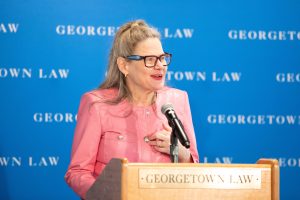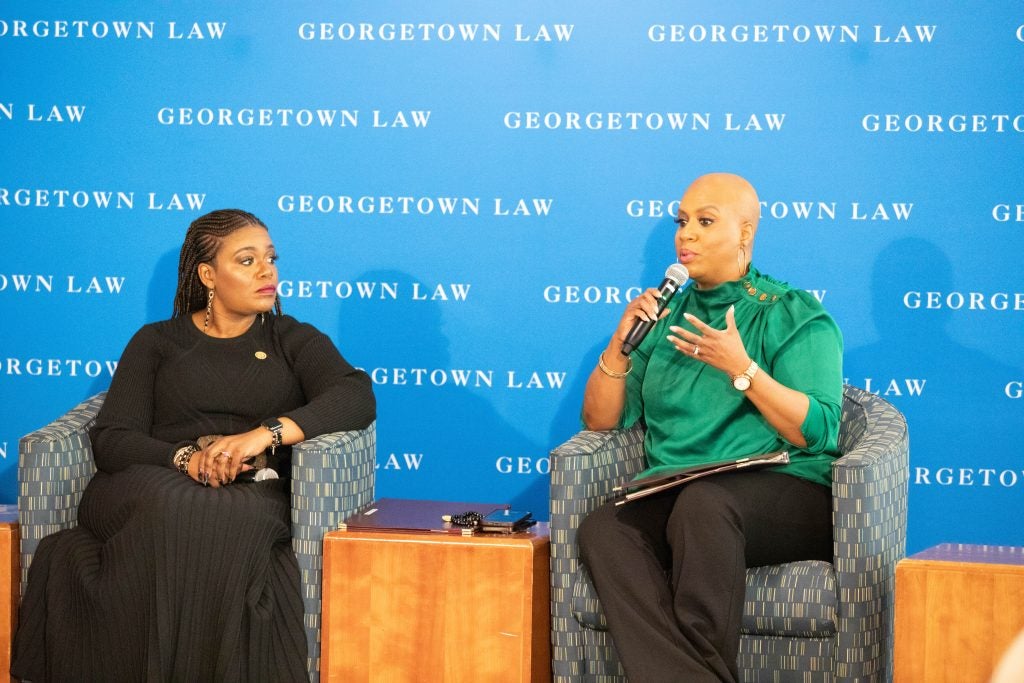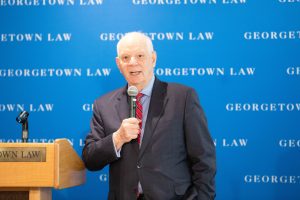A Path Forward for the ERA? Lawmakers, Academic and Advocates Come Together to Strategize
April 18, 2024

Participants at the 2019 Women's March in in Los Angeles championed ratification of the ERA.
In December 1923, the Equal Rights Amendment (ERA) was first introduced in the U.S. House and Senate. Coming just after the passage of the 19th Amendment, which gave women the right to vote, the ERA aimed to give women’s equality full Constitutional protection.

Georgetown Law Prof. Victoria Nourse was one of the conference’s organizers.
The proposed amendment has progressed in fits and starts over the century since. In 2020, the Virginia legislature became the 38th state to ratify the ERA, providing that crucial two-thirds threshold to make it part of the Constitution – but controversy still rages as to whether or not a deadline for passage set for 1982 means that the last several state votes for the ERA came too late.
Last week, a variety of stakeholders convened on the Georgetown Law campus to take stock of where the ERA currently stands and the possible pathways toward its ultimate ratification. Georgetown Law partnered with the Columbia Law School ERA Project to co-host “The Present and Future of the Equal Rights Amendment,” a conference that convened academics, advocates and federal lawmakers who have taken up the cause in this generation.

Rep. Cori Bush, left, and Rep. Ayanna Pressley, right, co-chairs of the Congressional Caucus for the Equal Rights Amendment.
The speakers for one of two keynote sessions were Representative Cori Bush (D-Mo.) and Representative Ayanna Pressley (D-Mass.), co-chairs of the Congressional Caucus for the Equal Rights Amendment. Both relatively new to Capitol Hill – Pressley was elected in 2018 and Bush in 2020 – they spoke with passion about how important they consider the ERA to be as a way to protect not only women but also people and groups with other marginalized identities.
“Through protests, organizing and understanding how intersectional our issues are, when I came to Congress, I realized so many of the things I was fighting for come under this one umbrella,” said Bush. “The word ‘woman’ is not even in the Constitution, so to enshrine gender in the Constitution is a ‘now’ thing. We can change what happens now.”
“If you care about gender-based violence, racial wealth gap, the gender wage gap and any other number of inequities… you should be behind the ERA,” said Pressley. “Although it’s taken 101 years too long, we do have more momentum than we have had in 40 years,” she added.
Columbia Law Professor Katherine Franke, a co-organizer of the conference and founder of their law school’s ERA Project, also spoke of the potential for the ERA to expand protection of rights beyond women’s issues alone. Using the number the ERA would take if it becomes the next Constitutional amendment ratified, they said, “I think the feminist movement owes an incredible debt to the movements for racial justice in this country. With a 28th amendment that has a more robust, independent, freestanding conception of equality, it could level up intersectional claims and do the work of modernizing the equal protection clause as well. We’re in this together. If we can move sex equality, let’s do it in a way that levels up race-based equality as well.”

Sen. Ben Cardin
Other Members of Congress who took part in the event included Senator Mazie Hirono, L’78 (D-Hawaii), who attended the closing reception, Senator Kirsten Gillibrand (D-N.Y.), Senator Alex Padilla (D-Calif.) and Representative Jennifer McClelland (D-Va.), all of whom provided videotaped remarks and Senator Cory Booker (D-N.J.), who submitted a written statement.
In another keynote presentation, longtime ERA supporter Senator Ben Cardin (D-Md.), who will retire at the end of this Congress after three terms in the Senate and ten in the House of Representatives, countered opponents’ amendments that the ERA’s ratification by the states has taken so long it should be considered expired.
“One hundred years is too long. I strongly support the efforts of the ERA. There is nothing in the Constitution of the United States, article 5, that talks about a time limit. There is no time limit on equality,” he said, adding, “As we know, the amendment passed before the Equal Rights Amendment is the one on Congressional pay – and that took 200 and some years for that to become ratified.”
Conference co-organizer Victoria Nourse, a professor at Georgetown Law and the current vice-chair of the United States Commission on Civil Rights, put the issues at stake this way:
“This is a democracy movement. A majority of our citizens have never been recognized in the constitutional text as having rights other than the right to vote.”
Watch remarks by Cardin. Bush and Pressley, as well as prerecorded statements from Sen. Kirsten Gillibrand (D-N.Y.) and Rep. Jennifer McClellan (D-Va.):
Videos of the other conference panels are being prepared for release and will be posted here when ready. The titles of the panels and their speakers:
“The ERA’s Role in Our Democracy,” with panelists Josh Chafetz, Agnes Williams Sesquicentennial Professor of Law and Politics at Georgetown Law; Linda Coberly, chair of the Appellate & Critical Motions Practice at Winston & Strawn LLP; Michele Bratcher Goodwin, Linda D. & Timothy J. O’Neill Professor of Law and co-faculty director of the O’Neill Institute for National and Global Health Law at Georgetown Law; David Pozen, the Charles Keller Beekman Professor of Law at Columbia Law School; and Julie Chi-Hye Suk, Professor of Law at Fordham Law School
“If Not Strict Scrutiny, Then What?” with panelists Naomi Mezey, Agnes Williams Sesquicentennial Professor of Law and Culture and co-founder of the Georgetown Gender+ Justice Initiative; Olatunde C.A. Johnson, Ruth Bader Ginsburg ’59 Professor of Law at Columbia Law School; Victoria Nourse, the Ralph V. Whitworth Professor in Law at Georgetown Law and Vice-Chair of the United States Commission on Civil Rights; Wilfred Codrington, Associate Professor at Brooklyn Law School; and Katherine Franke, the James L. Dohr Professor of Law and Director of the Center for Gender & Sexuality Law at Columbia Law School